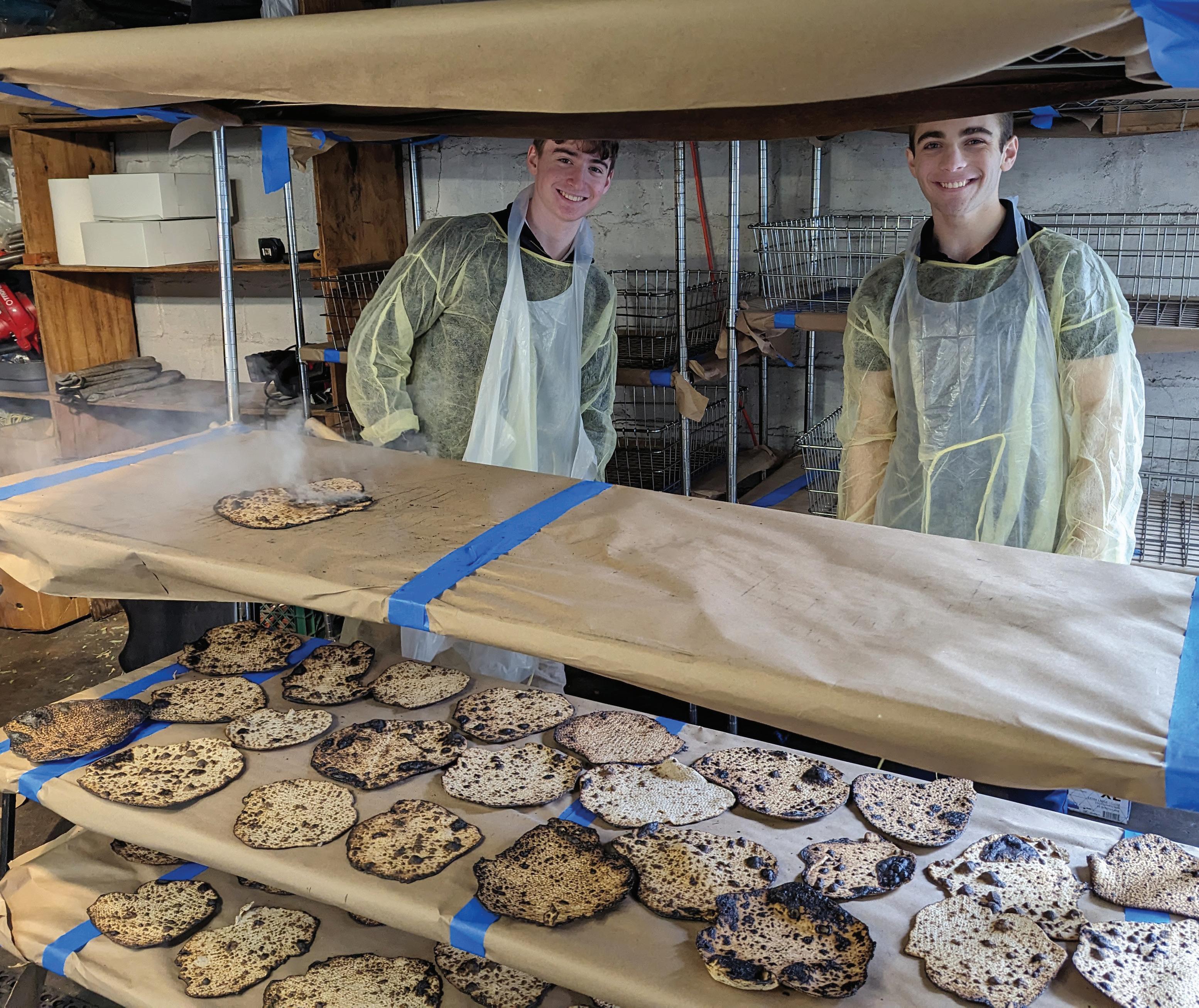
4 minute read
Ha Lachma Anya: An Open Door Policy
Rabbi Joshua Lookstein '88
Doorways are an even more prominent theme of the Seder than one may have thought. Towards the beginning of the Seder, in the Magid section, we read the paragraph of Ha Lachma Anya, and though we are not instructed to actually open the door - some do - we verbally invite those who are in need of a Seder to come in and join ours. Then, towards the end of the Seder, right before Hallel , we actually open the door to greet Eliyahu Hanavi. The doorway motif can be traced back to an obvious source: Bnai Yisrael in Mitzrayim putting blood on their doorposts, marking a home that Hashem should “pass over” during the plague of Makat Bechorot.
In his Haggadah, Meir Panim , Rav Meir Goldvicht, Rosh Yeshiva at Yeshiva University, points us to an earlier source than Mitzrayim: Sodom. When the angels come to save Lot, not only do doorways play a significant role but, according to Rashi, the entire story took place on Pesach. As you can see from the first verse quoted below from Parshat Vayerah, Lot served the angels Matzah. Thus, the doorways theme was present at the first mention of Pesach in the Torah. Rav Goldvicht develops an explanation of the significance of doorways by noticing other similarities between “Pesach-Sodom” and “Pesach-Mitzrayim.” In the table below, you can see them clearly: eating Matzah, the doorways, being inside and not going out, neither the Sodomites or the “ Mashchit ” being able to get to those behind the door, the directive to get up and leave the place they were in, and finally the hesitation to leave Sodom and the lack of hesitation to leave Mitzrayim
Genesis 19:3-16
(3) But he urged them strongly, so they turned his way and entered his house. He prepared a feast for them and baked unleavened bread, and they ate.
(6) So Lot went out to them to the entrance, shut the door behind him.
(11) And the people who were at the entrance of the house, low and high alike, they struck with blinding light, so that they were helpless to find the entrance.
(14) So Lot went out and spoke to his sons-inlaw, who had married his daughters, and said, “Up, get out of this place, for God is about to destroy the city.” But he seemed to his sons-inlaw as one who jests.
(16) Still he delayed. So the agents seized his hand, and the hands of his wife and his two daughters—in God’s mercy on him—and brought him out and left him outside the city.
יֵ֣חְקֹל ׀ ויָ֣נָתֲח־לֶא
ןֹ֖טָקִּמ םיִ֔רֵוְנַסַּבּ ֙וּכִּה ׃חַתָֽפַּה אֹ֥צְמִל
Exodus 12:8-39
(8) They shall eat the flesh that same night; they shall eat it roasted over the fire, with unleavened bread and with bitter herbs.
(22) Take a bunch of hyssop, dip it in the blood that is in the basin, and apply some of the blood that is in the basin to the lintel and to the two doorposts. None of you shall go outside the door of your house until morning.
(23) For יהוה, when going through to smite the Egyptians, will see the blood on the lintel and the two doorposts, and יהוה will pass over the door and not let the Destroyer enter and smite your home
(31) He summoned Moses and Aaron in the night and said, “Up, depart from among my people, you and the Israelites with you! Go, worship יהוה as you said!
(39) And they baked unleavened cakes of the dough that they had taken out of Egypt, for it was not leavened, since they had been driven out of Egypt and could not delay ; nor had they prepared any provisions for themselves.
According to Rav Goldvicht, Lot’s inviting the angels into his home, a counter-cultural act, is what saved him. He was channeling Avraham’s unwavering commitment to Hachnassat Orchim , welcoming others - or, more precisely, “the other” - into one’s home. Lot survives and, eventually, his descendant (through Rut) is David Hamelech, a redeemer of the Jewish People. That is the message of the first Pesach. So, at the Seder, we begin by welcoming others through our doors and we end by opening the door for Eliyahu Hanavi, heralding the ultimate redemption of the Jewish People which the Talmud ( Masechet Rosh Hashana ) says will occur in Nisan, the same month as Yetziat Mitzrayim. One door-opening actually opens two doors. The need for Jews to open our doors to others - physically, emotionally, and philosophically - is, as cliche as it sounds, never more important among the Jewish People than now.
There is another, hard to miss, connection between Pesach-Sodom, Pesach-Mitzrayim, and Eliyahu Hanavi at the Seder, that also resonates with the 21st century Jewish condition: protecting ourselves from enemies at our gates. In Sodom, it was the Sodomites, in Mitzrayim, the Egyptians, and at the Seder, as we open the door for Eliyahu, we say the paragraph of Shfoch Chamatcha al Hagoyim , alluding to anti-Semites throughout history. While the open-door allows people to enter, the closeddoor, the “ petach” that neither the Sodomites nor the Mashchit could penetrate, prevents people from entering. There are times we need our doors to be closed and times we need them to be open.
The ritual around Elihayu Hanavi, though, is a paradox. Why open the door precisely when it ought to be closed? To take the words of the author of the Aruch Hashulchan (quoted by Rav Goldvicht) in a slightly different direction, opening the door at that moment is a demonstration of our faith in Hashem, that, no matter how bleak a situation looks, Hashem will open some doors, we will open some doors, and open doors will win out over closed doors.
Chag Kasher v’Sameach u’Patuach !




